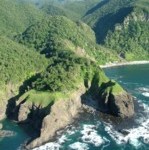 Shiretoko – Photo: David Sheppard
Shiretoko – Photo: David Sheppard
Johannesburg – JAPAN'S Shiretoko Peninsula, Thailand's Dong Phayayen-Khao Yai forest, Egypt's Whale Valley and India's Valley of Flowers National Park were among eight new world heritage sites designated 15th July.
The other four were the west Norwegian fjords, South Africa's Vredefort Dome, the Gulf of California in Mexico and Coiba National Park in Panama, the World Conservation Union (IUCN) said in a statement.
The decision to add the eight sites on the prestigious list was made at a meeting in the eastern coastal town of Durban of UNESCO's World Heritage Committee comprising officials from 21 countries.
Situated on Japan's Hokkaido island, the Shiretoko Peninsula was cited for its unique marine species such as the endangered Steller's sea lion and also for its many migratory birds. It also boasts a large brown bear population.
India's Valley of Flowers National Park, an extension of the Nanda Devi national park in the Himalayas, is known for its meadows of alpine flowers and is home to rare animals such as the Asiatic black bear, the snow leopard, brown bear and blue sheep.
Located in the mountains of northeastern Thailand, the Dong Phayayen-Khao Yai Forest Complex is home to more than 800 species of fauna, including 392 species of birds in tropical forests that are key to their long-term survival.
South Africa's Vredefort Dome, a huge crater formed two billion years ago by a meteorite, spans two provinces and is the oldest and largest meteorite impact site in the world.
Wadi al-Hitan, or Whale Valley, in the western desert of Egypt, was cited for its invaluable fossil remains of the earliest now extinct whales.
Norway's Geirangerfjord and Naeroyfjord, situated in the southwest, are among the world's longest and deepest fjords, offering outstanding scenery, with crystalline rock walls that rise up to 1400 metres from the Norwegian sea.
Comprising 244 islands and marine areas, the Islands and Protected Areas of the Gulf of California in northeastern Mexico is home to 39 per cent of the world's total number of species of marine mammals and a third of the world's marine cetacean species.
Panama's Coiba National Park, located in the Gulf of Chiriqui in the central Pacific ocean, was cited for its conservation efforts, providing a home to 760 species of fish, 33 species of sharks and 20 species of cetaceans.
"Four of the new sites contain outstanding coastal and marine areas: Shiretoko peninsula of Japan, the Norwegian Fjords, the Gulf of California and Coiba National Park of the Pacific," said the IUCN, an advisory body to the world heritage committee, said in a statement.
"The inscription of these eight sites is recognition of their outstanding universal value for humankind and the need to preserve them for future generations," it said.
The World Heritage Committee is examining proposals for 42 new sites on the list at the meeting that is due to end on Saturday.
The World Heritage list currently includes 788 properties in 134 countries.



